The Surrey County Chess Association runs a bewildering number of competitions of various types, one reason being that they’ve chosen to commemorate some of their long-serving administrators through trophies in their memory.
The main league itself currently has five divisions. The first division is the Surrey Trophy, which dates all the way back to the 1883-84 season, while the second division, the Beaumont Cup, was instigated twelve years later, in the 1895-96 season.
I’m sure you’d like to know, as I did, more about Mr Beaumont. Well, he wasn’t Mr Beaumont at all, but Captain Alexander Spink Beaumont, Alex to his friends. It’s a long story.
He was born in Manchester on 24 June 1843 into a family with military connections. Beaumont was in fact his paternal grandmother’s surname but his father used his mother’s surname. Spink was the surname of his Aunt Charlotte’s husband.
He served in the 23rd Foot Regiment of the Royal Welch Fusiliers, reaching the rank of Captain in 1871, when the census found him at Fort Hubberstone in Pembrokeshire. Perhaps it was there that he met Caroline Savage (née Griffies-Williams), a widow more than 20 years older than him, who came from a family of wealthy Welsh landowners, one of whose properties was in Tenby, not all that far from Milford Haven. She was born in 1822 but often claimed to be much younger.
The following year Alex and Caroline married in London, both giving an address in Inverness Terrace, north of Hyde Park, which was by now the Beaumont family residence. He then resigned his commission and, round about 1878, they settled at 2 Crescent Road, South Norwood, in South London. This is now Warminster Road, running by the railway line north of Norwood Junction Station. There are a few grand houses at what is now the high numbered end of the road, and I’d guess one of those was their residence.
As a gentleman of independent means, he had plenty of time to pursue his two passions in life: chess and music. He was a composer as well as a player in both fields, but was also a gifted organiser and promoter. Beaumont wasted little time joining Croydon Chess Club, the first ‘modern’ chess club in Surrey. In 1880 he had a problem published in the local paper. You’ll find the solutions to all the problems at the end of this article.
Problem 1: #3 Croydon Guardian 28 August 1880
The 1881 census found Alex and Caroline living in South Norwood along with his unmarried brother Richard, a Major in the Royal Engineers, four domestic servants, one male and three female, and a nurse.
Later the same year he had some important news.
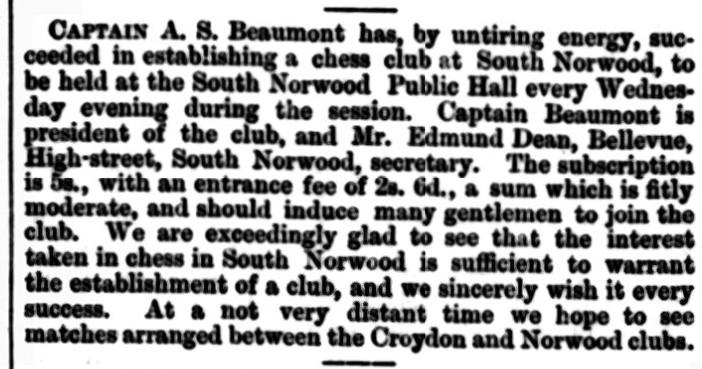
Beaumont was nothing if not ambitious for the new club.
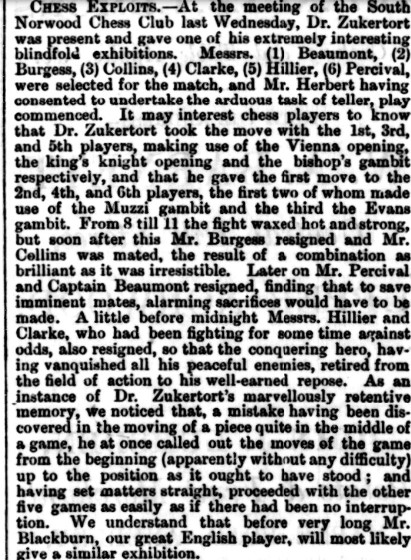
Zukertort and Blackburne were, according to EdoChess, the second and third strongest players in the world behind the inactive Steinitz at the time. Attracting them to visit a new club in a London suburb was quite a coup. Regular simultaneous displays, both blindfold and sighted, by professional players would become a regular feature of the South Norwood Chess Club.
it wasn’t long before Blackburne visited, and Zukertort was there as well, acting as teller.
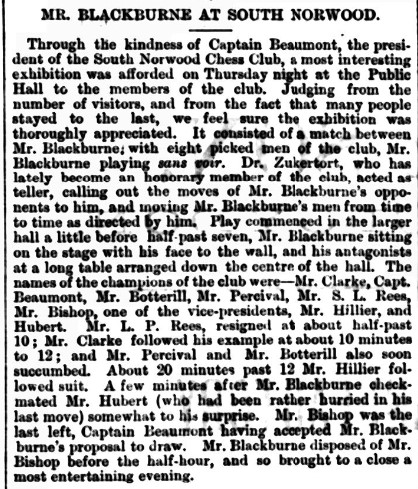
You’ll also note the name of Leonard Percy Rees, the most influential English chess organiser of his day, involved with the establishment of everything we now know and love, from the Surrey County Chess Association through to FIDE. I really ought to write about him at some point.
During this period he was very active on the composing front. One of his problems even took first prize in a local competition.
Problem 2: #2 1st Prize Croydon Guardian 1882
He was now being published nationally as well as locally.
Problem 3: #3 The Chess Monthly June 1882
This three-mover shouldn’t be too challenging for you.
Problem 4: #3 The Field 19 August 1882
Meanwhile, South Norwood were playing friendly matches against their local rivals from Croydon. There was also talk of an international tournament in London the following year, and Beaumont was the first to make a financial contribution.
By the autumn of 1883 chess in Surrey was moving rapidly towards the thriving county association we see today, thanks to the likes of Joseph Steele, Leonard Rees and Alexander Beaumont, who was elected a vice-president.
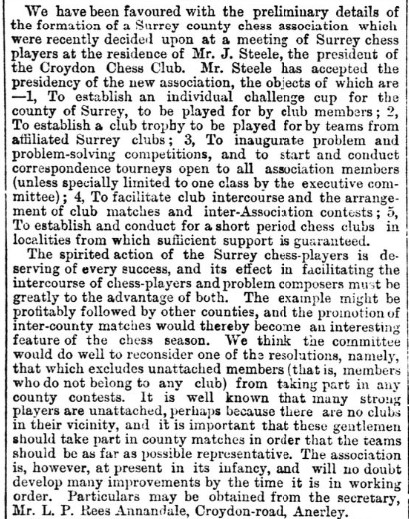
By now the President of the Surrey County Chess Association, the ‘genial and hospitable’ Captain Beaumont’s chess get-togethers were becoming grander by the year, in 1885 attracting about ‘150 gentlemen’.
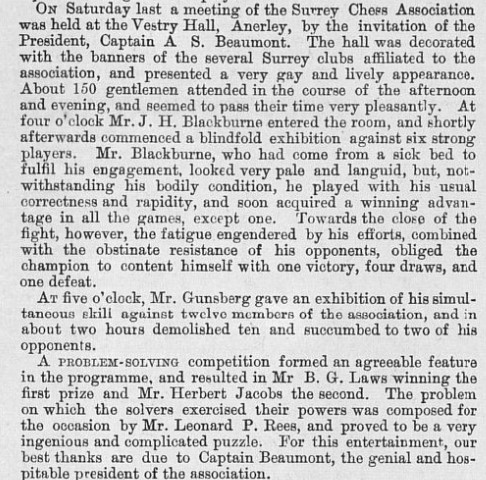
At the same time, along with involvement in the British Chess Club, he was also organising musical events. Here, his two interests were reported in adjacent articles.
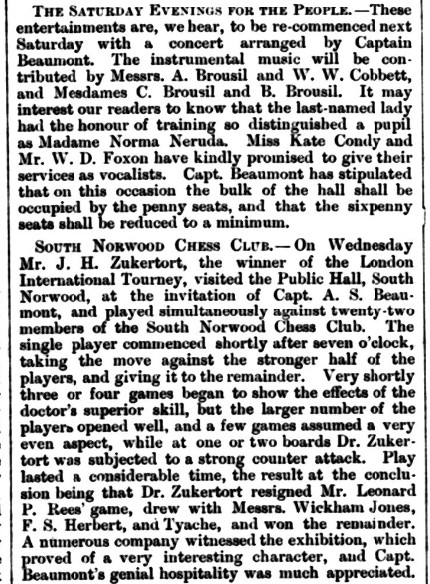
The name of Walter Willson Cobbett, one of his regular musical collaborators, may not be familiar to you, but it certainly is to me.
Although he was not composing so many problems, he was becoming more involved in composing music, and, from 1890 onwards his compositions were being published by Charles Woolhouse in Regent Street.
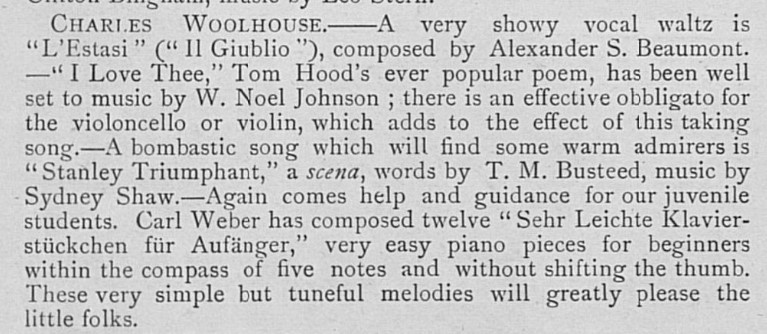
Look who else Woolhouse was publishing: our old friend (and my cousin’s father-in-law) W Noel Johnson, whom you might have met here. One online source suggests that Woolhouse was a pseudonym for Beaumont, but that doesn’t appear to be the case: there really was a music publisher of that name.
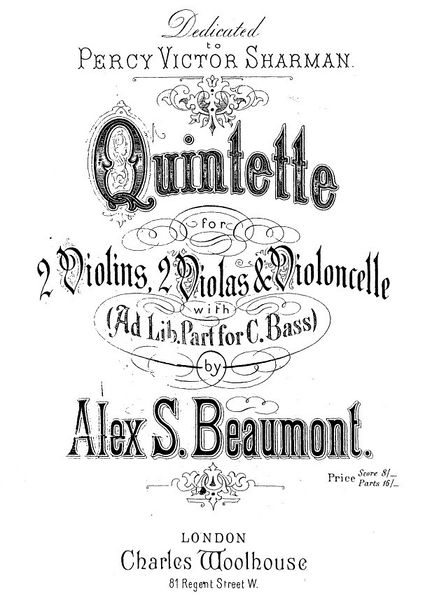
Percy Victor Sharman, the dedicatee of this work, was a young violinist living in Norwood.
The family doesn’t appear in the 1891 census: it looks like their side of the road might have been missed by mistake.
That year there was good news for South Norwood when they won the Surrey Trophy for the first time. They would go on to win it again in the following three seasons.
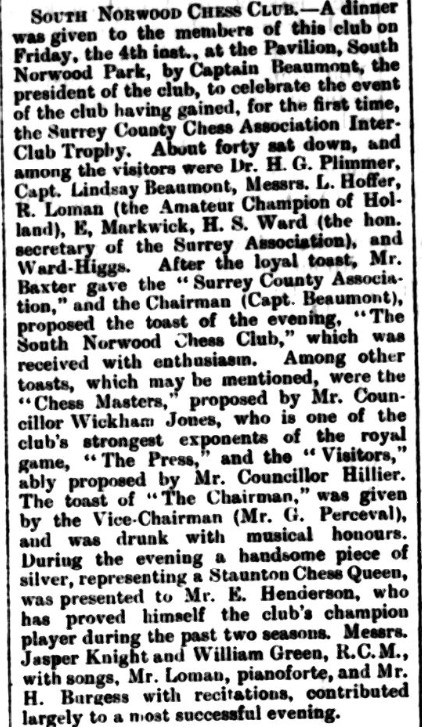
Some of the guests are notable. Captain Lindesay Beaumont was Alex’s younger brother (his older brother Richard had died in 1884). Rudolf Loman was a Dutch chess master and organist. Edward Markwick was a lawyer whom you’ll meet again later in this article.
In December 1893 Beaumont’s portrait appeared in The Chess Monthly.
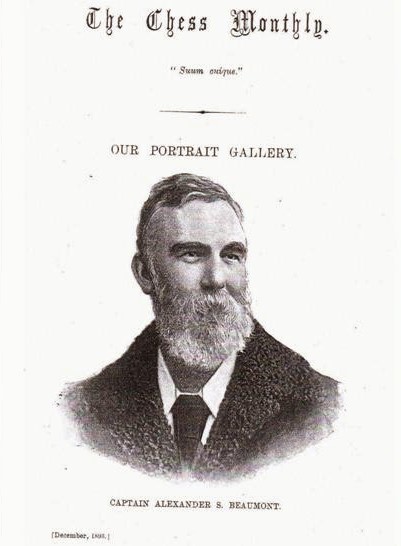
In January 1894 (or perhaps late December) South Norwood Chess Club ran another of their popular simuls, this time with Richard Teichmann as the guest. He played 18 games, losing one game and drawing two, one of them against Captain Beaumont. This was described in the local press as “a good example of (Beaumont)’s bold and energetic play. (As always, click on any move for a pop-up window.)
His counter-gambit worked well and he missed a simple opportunity to win a piece in the opening.
In 1895 he presented a trophy – yes, the Beaumont Cup – to be competed for by some of the smaller Surrey clubs further out from Central London. My great predecessors at Richmond won it in its second year. Beaumont’s old club, South Norwood, were among the five clubs taking part in the 2023-24 edition.
Captain and Mrs Beaumont were by no means always at home. They spent a lot of time on the continent, partly for health reasons, partly because they enjoyed travelling and partly because they owned property abroad, including an Italian villa.
At various times they visited, as well as Italy, France, Hungary and perhaps Malta. In 1896 the Captain turned up in Nuremberg to watch the international chess tournament there (his friends Blackburne and Teichmann were taking part, but no match for Lasker), and found himself taking part in a concert.

Adolph Brodsky was one of the leading violinists of his day, giving the first performance of Tchaikovsky’s Violin Concerto. There’s something about his chess career here, but my article about him is no longer available. I don’t think he’d have consented for any pianist who wasn’t extremely proficient to accompany him.
On 30 October 1897 he was back in Surrey, losing to his old friend Leonard Rees in a match between South Norwood and Redhill.
This time he chose a different variation of the Scandinavian Defence, but without success.
In January 1898 Beaumont was abroad again, this time in Florence. He was proud of the conclusion of this game, where his third move forced mate in 4.
He couldn’t have imagined that, a century and a quarter later, we’d have machines in our pockets telling us immediately that 1. Rf7 would have been mate in 5.
In March 1898 the Streatham News started a chess column, and Captain Beaumont provided the first problem.
Problem 5: #2 Streatham News 26 March 1898
A few weeks later he submitted a problem composed by his late brother Lieutenant-Colonel Richard Henry Beaumont Beaumont (yes, there were two Beaumonts). I haven’t been able to find any other problems composed by Richard, or any more information about his chess career. However, I have managed to find his sword, which was auctioned in 2012, here.
Problem 6: #3 Streatham News 7 May 1898
By that autumn there was talk of running another major international tournament in London the following year. Beaumont, of course, was quickly in with a donation and was appointed to the organising committee led by his friend Sir George Newnes. This was the tournament where Francis Lee might have played on the board later acquired by Leonard Grasty.
On 26 November there was a visit from the Ladies’ Chess Club. The ever genial Captain was on hand to host the event.
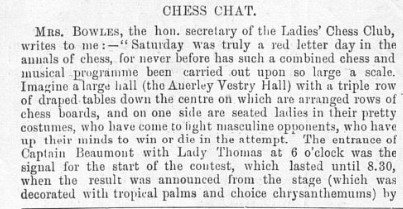
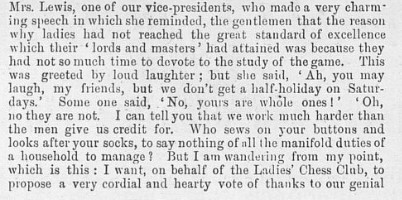
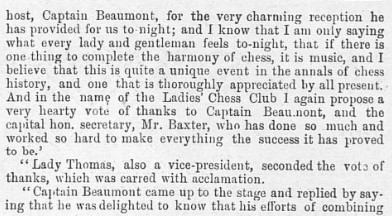
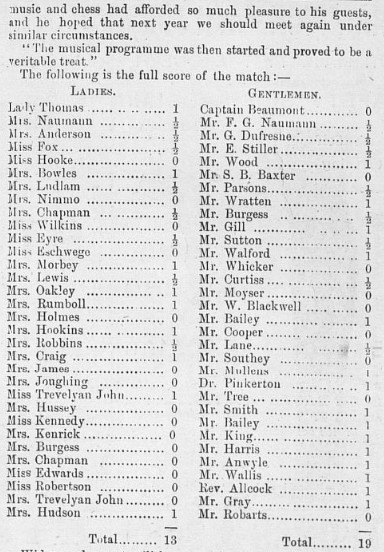
I’d imaging the top two boards were honorary encounters. Lady Thomas was the mother of Sir George. Prussian born coffee merchant Frank Gustavus Naumann, drawing with his wife in interests of marital harmony, would later become the first President of the British Chess Federation, and later still lose his life on the Lusitania.
Here’s the top board encounter: the protagonists had been friends for many years. Black stood little chance after losing material in the opening.
There was more on the music elsewhere.
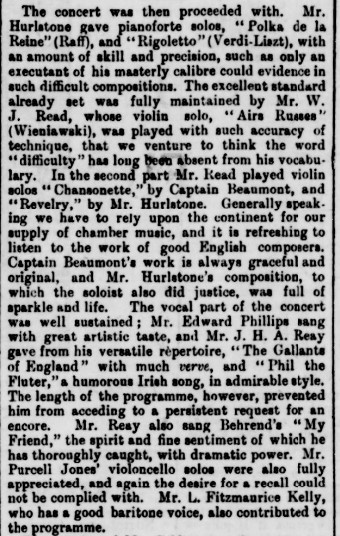
Coincidentally, as I write this I’ve just returned from a piano recital at which the Verdi-Liszt Rigoletto paraphrase was also played.
William Yeates Hurlstone is of considerable interest. A composer of exceptional talent, Beaumont supported him financially after the early death of his father, but he sadly died at the age of only 30. Much of his music has been recorded: there’s a YouTube playlist here.
Violinist William J Read would, in 1912, give the first performance of the violin concerto of another tragically short-lived South London composer, Samuel Coleridge-Taylor.
On 5th January 1901 Captain Beaumont organised an even bigger chess event at Crystal Palace. This merited a major feature in the following month’s British Chess Magazine (online here).
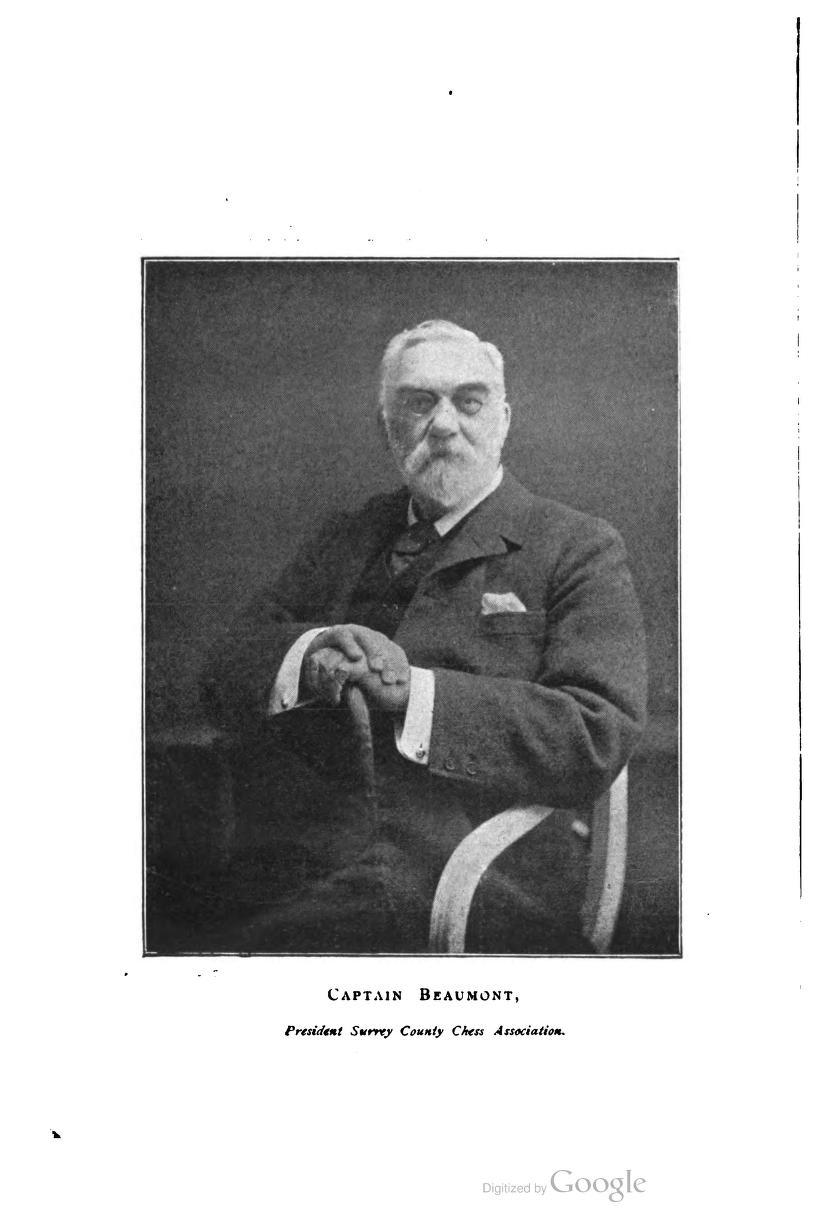
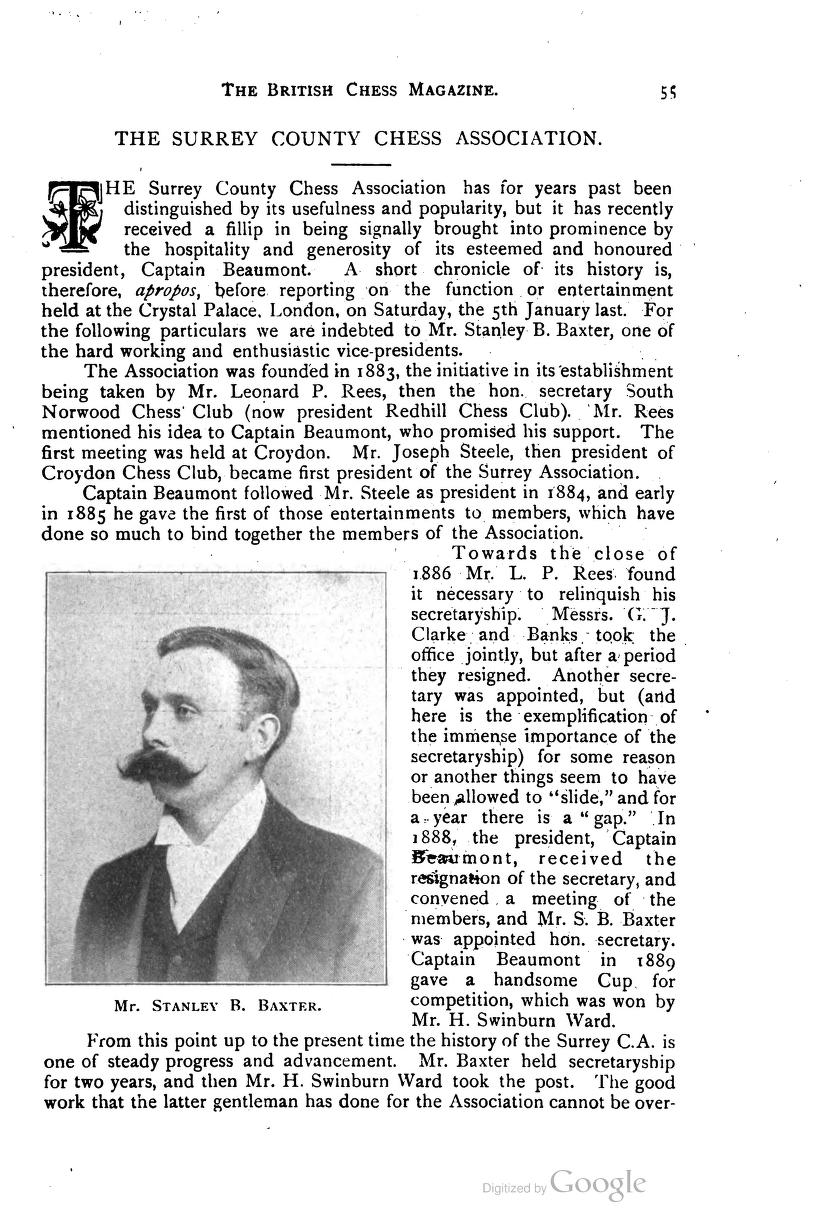
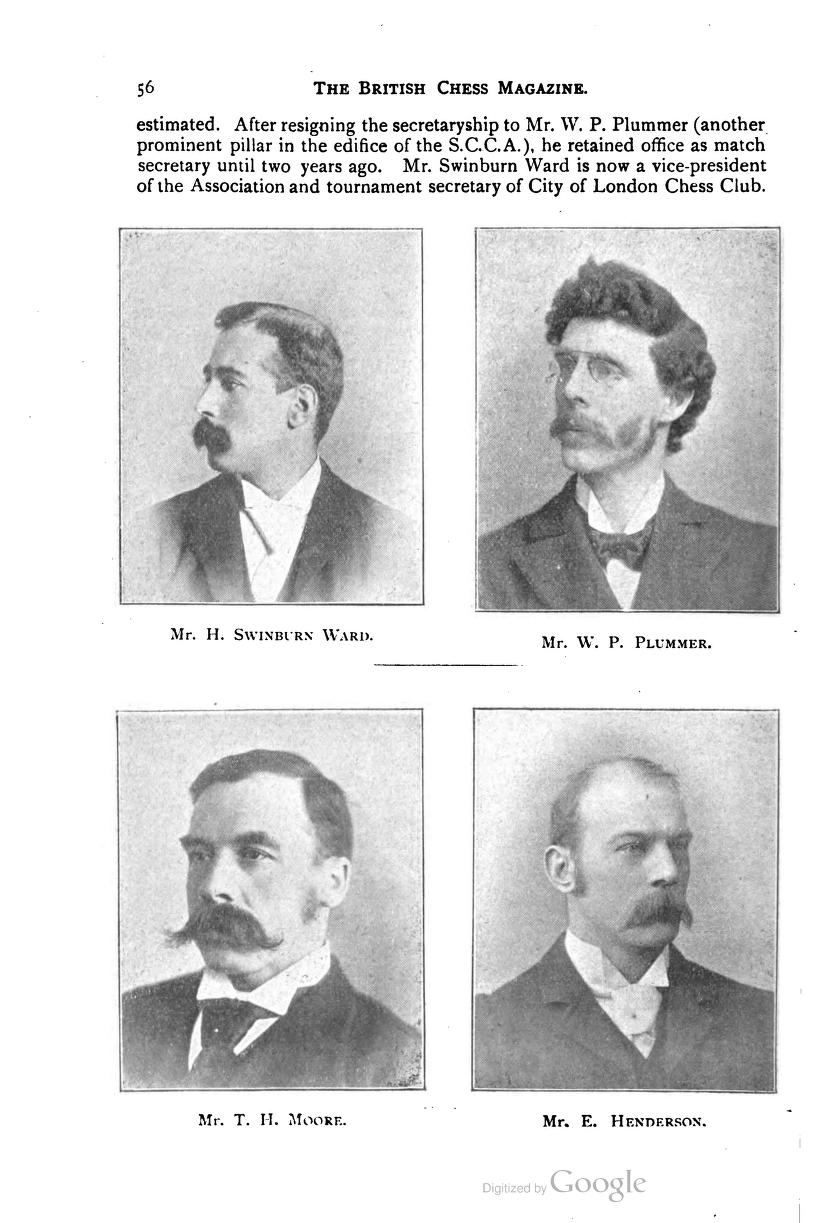
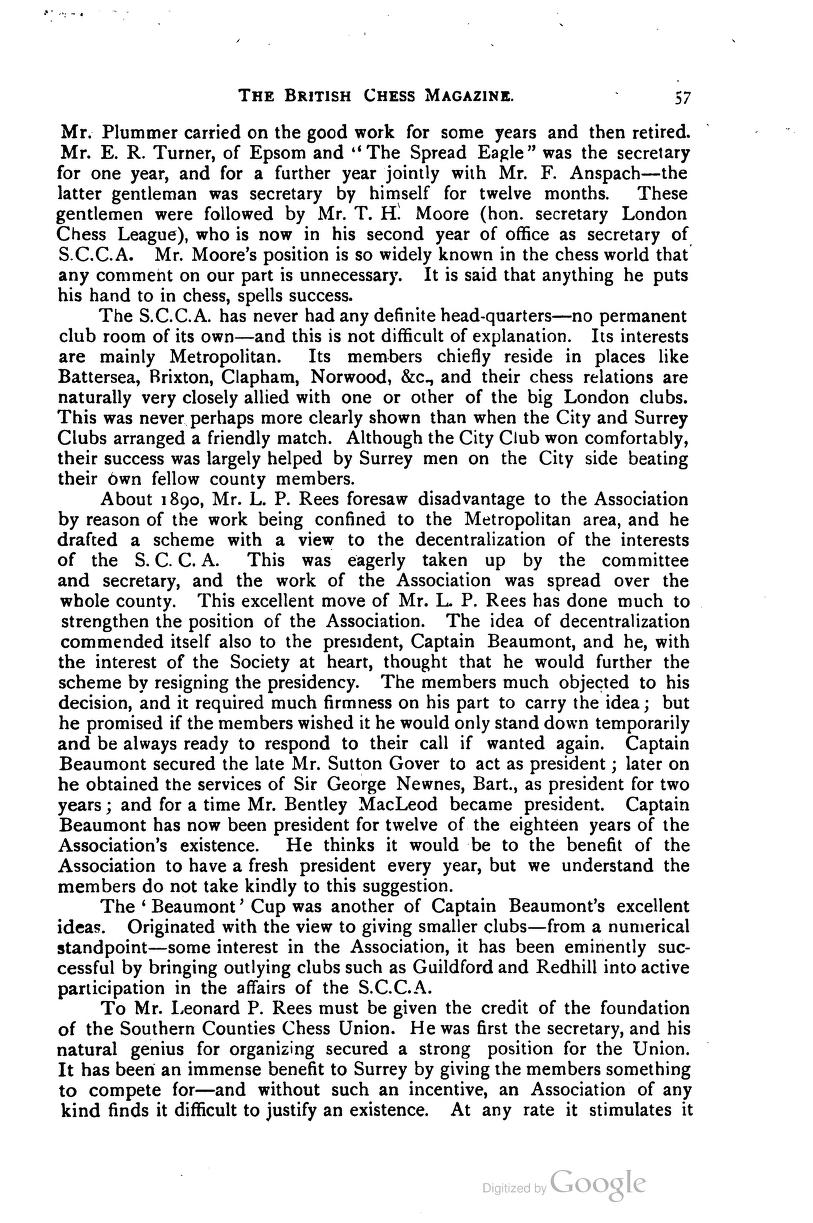
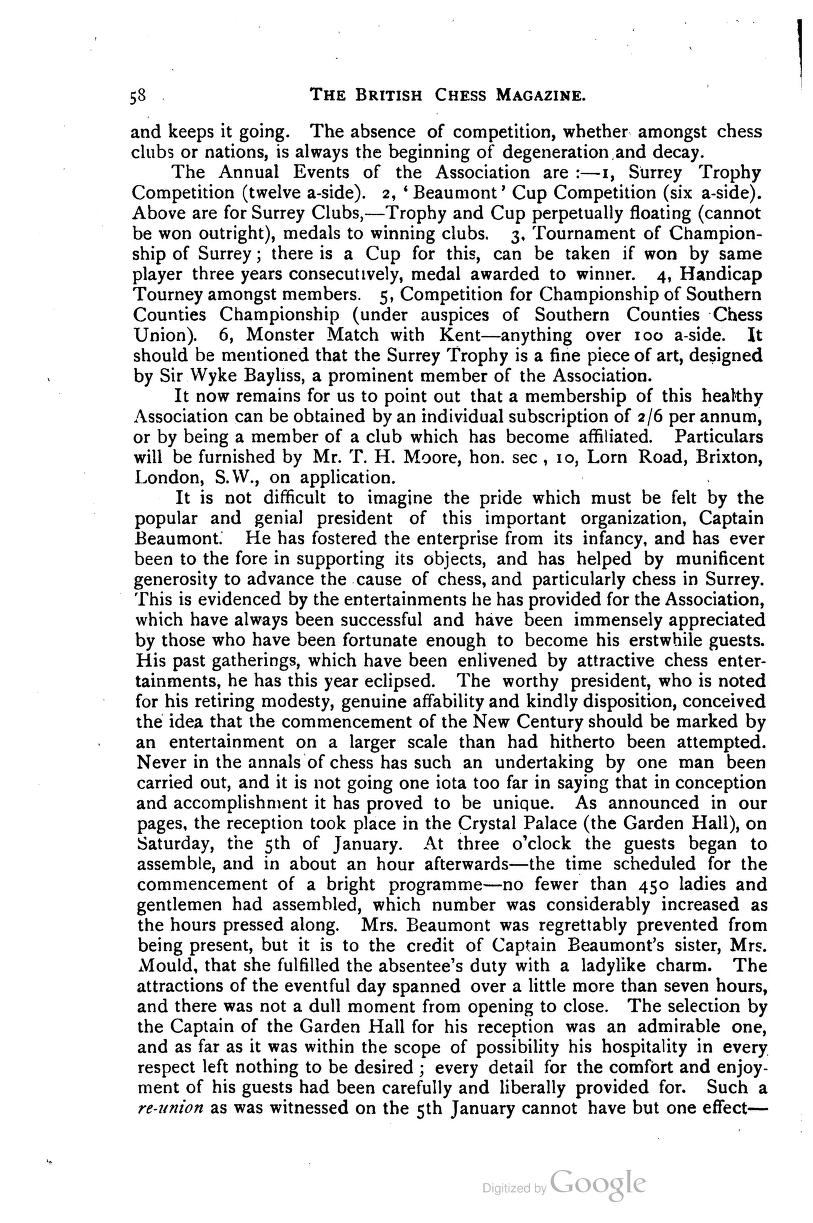
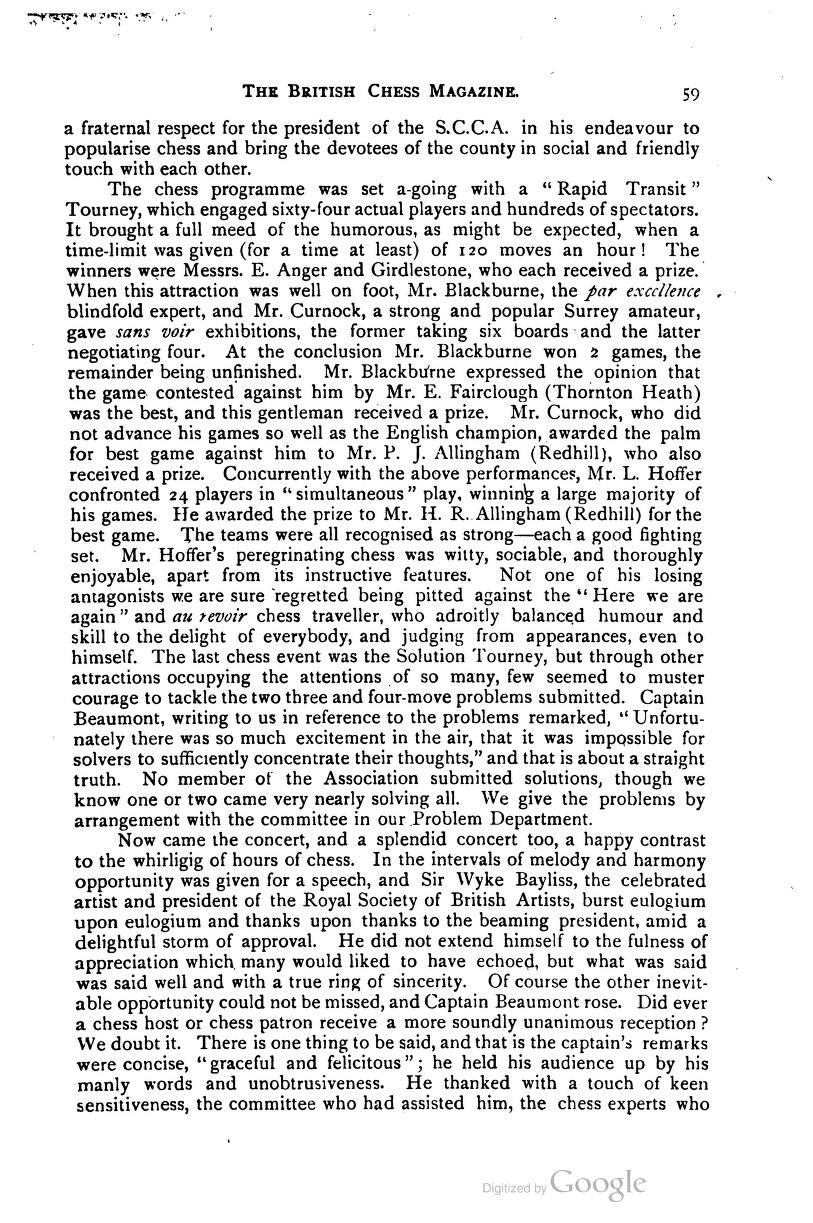
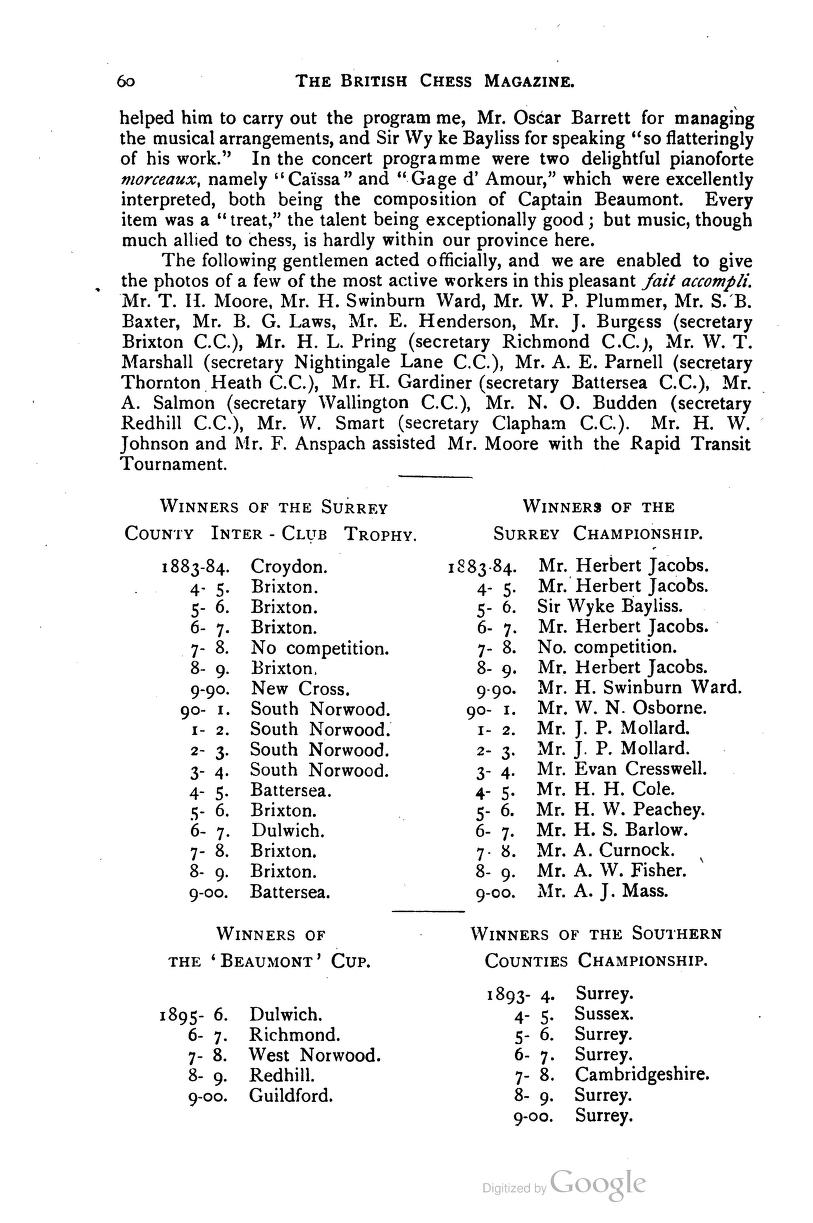
The 1901 census found him at home with his wife and four servants: a valet, a parlourmaid, a cook and a housemaid. But now his health was starting to fail and his wife was approaching her 80s. He was often unable to attend chess events, either because he was unwell or because he was travelling somewhere with a more agreeable climate. This seems, as we also saw with Francis Joseph Lee, to have been standard medical advice in those days.
A couple of years later a clergyman, Albert William Gibbs, who had been born in 1870, gave up his curacy to move in with them as a companion and carer.
Captain Beaumont had one last gift for British Chess. In 1904 the British Chess Federation was formed, with Frank Naumann as the first President and Leonard Rees as the first Secretary. Naumann presented the trophy for the British Championship itself, while Beaumont donated that for the British Ladies Championship. “A very elegant silver rose bowl on Elizabethan scroll-work, enriched with chess emblems”, made by Messrs Fattorini and Sons of Bradford, the first winner was Miss Kate Belinda Finn, with a commanding score of 10½/11.
Caroline Beaumont died in 1907, and in 1908 the Captain was advised by his doctor to move, as the London clay on which his house was built wasn’t good for his health. He soon found a new residence built on gravel three miles to the east, in Beckenham.
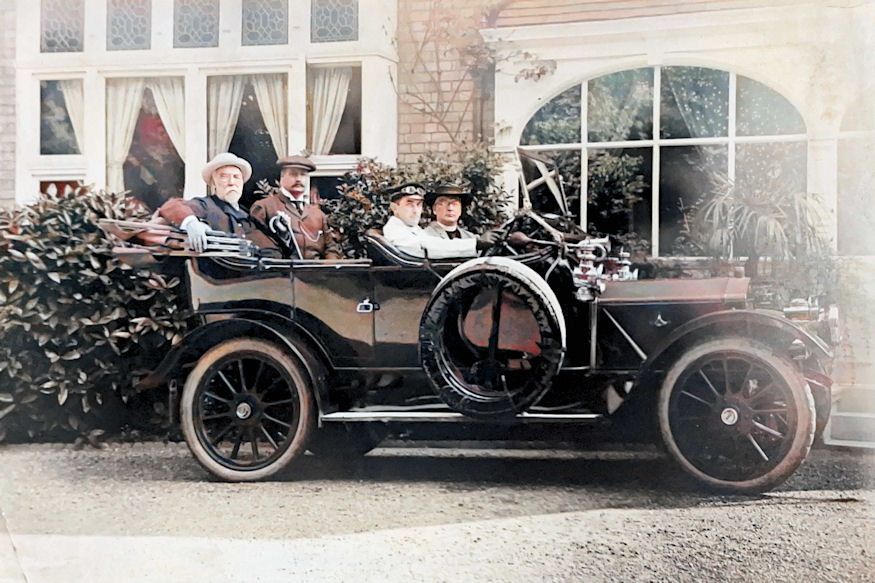
This rather splendid photograph shows his chauffeur Walter Goldsack at the steering wheel with Albert Gibbs in the passenger seat. The identity of the other passenger is unknown. It was posted on a family tree by Mark Beaumont, great great grandson of Alexander’s brother Lindesay. I’m advised by Dr Upham, an expert on the subject, that the car is undoubtedly American, so I guess it would have been quite expensive.
In the 1911 census, Alexander and Albert (described as a ‘visitor’) were living there, along with a cook-housekeeper, a parlourmaid and a housemaid. We’re additionally informed that the house had 14 rooms, including the kitchen but excluding the bathroom.
The following winter he travelled south in search of better weather.
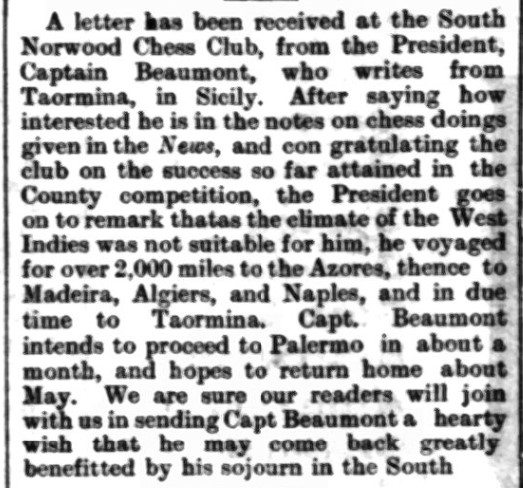
But that was to be his last journey. He died on 4 September 1913, at the age of 70.
The obituaries were effusive.
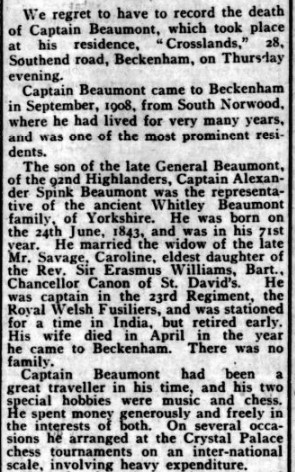
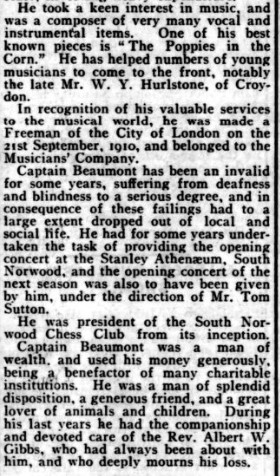
“A man of splendid disposition, a generous friend, and a great lover of animals and children.”
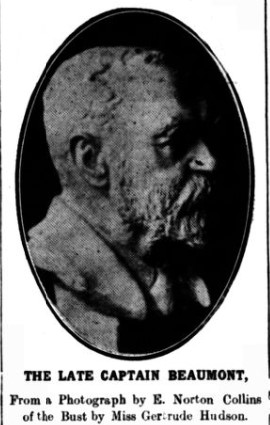
One of the obituaries published this game as a sample of his play, without, unfortunately, giving any indication of when, where or against whom it was played.
Here’s his probate record.

This is round about £8.3 million today. Probate was granted to his nephew (and closest relation), his companion, to whom he bequeathed £400 plus an annuity of the same amount, and his solicitor.
Captain Alexander Spink Beaumont appears to have been, in every respect, an admirable fellow, much loved and respected by everyone who knew him, either through chess or through music.
It seems only right that his name should still be remembered by Surrey chess players today, more than a century after his death.
And yet, there was another side to him as well.
Let me take you back 40 years, to 11 September 1873. Alexander Spink Beaumont, recently retired from the army and recently married, is living in Norton House, one of his wife’s family properties, in the seaside resort of Tenby, Pembrokeshire. He invites a 14 year old local lad named George Lyons, the son of a boatman working in the coastguard service, to his house, and, if you believe George’s account, invites him upstairs. He asks the boy if he can keep a secret, attempts to perform an act so disgusting that it cannot be mentioned in the press, gives him three shillings and sixpence, and then takes him down to the garden. George, quite correctly and courageously, goes home and tells his mother. His parents summon the authorities and, the following evening, his father returns the money to Captain Beaumont in the presence of a witness. On 3 October the allegation goes before the magistrates. Beaumont’s domestic staff are called as witnesses and deny that anything untoward could possibly have happened. Nevertheless, the magistrates decide there is a case to answer (‘making an assault upon George Lyons, with intent to commit an abominable crime’) and send the captain to trial.

The following February Beaumont appeared before the Pembrokeshire Spring Assizes. The judge considered the evidence improbable and contradictory and instructed the jury to dismiss the case, which they duly did.
Well, I wasn’t there so I don’t know for certain, but young George’s account seems fairly convincing to me. I guess the judge felt that a gentleman couldn’t possibly have committed such an act. Then, as now, if you’re rich or famous you can get away with almost anything. Perhaps it served as a warning to him as there’s no evidence that he ever did anything of that nature again.
Let’s now move forward a few years, to 1881, the year in which an ambitious young publisher named George Newnes started a general interest weekly magazine called Tit-Bits. The magazine proved highly successful, Newnes, a chess enthusiast, made a lot of money and went on to sponsor, amongst much else, the Anglo-American Cable Matches.
A few years later, a young journalist named Alfred Harmsworth submitted some articles to Newnes for publication, soon deciding that he could make more money by starting his own magazine. In 1888 he started a weekly called Answers, providing answers to a wide range of questions submitted by readers or just made up. A friend of his father, Edward Markwick (yes, you’ve met him earlier in this article), joined the venture, and he persuaded his friend – yes, Alexander Spink Beaumont, to provide financial support. Adrian Addison’s gossipy history of the Daily Mail, Mail Men, suggests that some thought Beaumont may have had ‘an unrequited homosexual motive in getting behind the pretty young journalist’.
At first, the Beaumonts and Harmsworth were the best of friends, but in 1891 a bitter argument between them ensued and eventually they sold their shares in his company. There’s much in Reginald Pound’s biography Northcliffe, which can be read online (although the OCR is poor) here. Caroline, who seems to have been the dominant partner, is described as ‘charmingly uncommon’. Meanwhile, in 1896 Alfred Harmsworth and his brother Harold launched the Daily Mail, becoming, as a result, rich and famous.
Years later, in 1905, the year of the establishment of Associated Newspapers, the case flared up again.
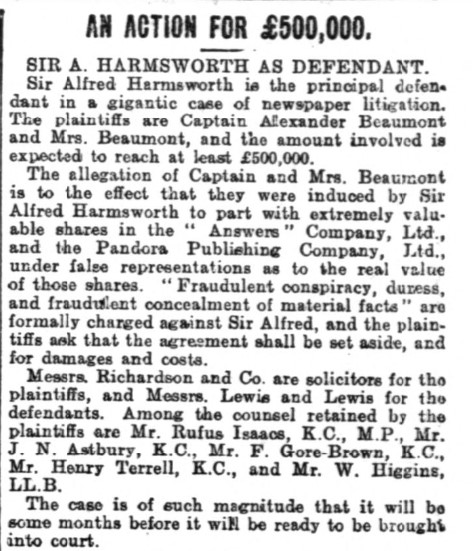
It looks as if the Beaumonts, jealous of the success of the Daily Mail, were trying to get half a million pounds (about 76 million today) back from the shares they sold 14 years earlier. Harmsworth put in a counter suit accusing the papers who published this report of libel, and the whole affair was quietly dropped. Very strange.
What, then, should we make of Captain Alexander Spink Beaumont? it seems to me highly likely that he was gay at a time when same-sex relationships were illegal. Should we feel sorry for him, or, looking at the allegations of George Lyons, revile him? Or perhaps we should just remember his services to the game of chess, as a player and problemist, but most of all as an administrator, promotor and populariser of his – and our – favourite game.
One final thing, there’s a thread on a military badges forum here from a collector who has miniature portrait lockets, acquired separately, of Alexander and his older brother Richard. A rather wonderful thing to have.
He’s not the only Alexander to have given his name to a Surrey chess trophy, but that’s something for another time. I have other stories to tell first. Join me again soon for another Minor Piece.
Sources and Acknowedgements:
ancestry.co.uk
findmypast.co.uk/British Newspaper Library
Wikipedia
Yet Another Chess Problem Database
MESON problem database (Brian Stephenson)
Internet Archive (archive.org)
chessgames.com
Movers and Takers, and various blog posts by Martin Smith
EdoChess (Rod Edwards)
Surrey County Chess Association website
Other online sources linked to in the text
Problem solutions (click on any move to play them through):
Problem 1:
Problem 2:
Problem 3:
Problem 4:
Problem 5:
Problem 6:
